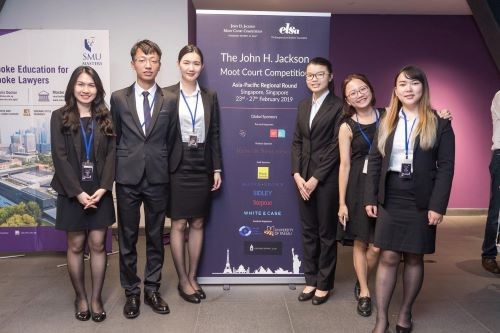 Introduction of the 17th John H. Jackson Moot Court Competition on WTO Law
Introduction of the 17th John H. Jackson Moot Court Competition on WTO Law
The John H. Jackson Moot Court Competition (formerly known as the ELSA Moot Court Competition) is a simulated hearing of the WTO dispute settlement system held by the European Law Students’ Association annually. Participants from all over the world are separated into several regional rounds, and the best 20 teams out of these regional rounds will qualify for the Final Oral Round which takes place at the WTO Headquarters in Geneva, Switzerland. This year, the Asia-Pacific regional round was held in Singapore, Singapore, from February 23rd to February 27th. The Final Oral Round was held from June 6th to June 11th in Geneva, Switzerland.
The 2018-2019 NTU team included four team members, Ting-Yu Chang, Yu-Chun Liu, Jhih-Wen Yang, and Chuan-Ting Huang, and two student coaches, Zhen-Yi Wu, and Angelique Saw. Professors Tsai-Yu Lin and Yueh-Ping (Alex) Yang from the Asian Center for WTO & International Health Law and Policy served as faculty advisors.
The fictitious case of this year involves the following issues:
(1) Under GATT Arts. I:1, III:4, and GPA Arts. IV:1 and IV:2, the main issues concern the relation of GATT Arts. III:8 and II:4, whether products which associate with child labour abuse are like products with those which are not, and whether the procurement was awarded under domestic laws in order for GPA to apply to this case.
(2) Under GATT Art. XXIV, the key issue concerns whether an FTA interim agreement can involve a non-Member.
(3) Under GATT Art. XX, the issue is whether any inconsistencies with GATT can be justified by any of the subparagraphs and whether such justification is not applied in an arbitrary or unjustifiable manner under the Chapeau.
(4) Under SCM Art. 3.1(b), the key issue concerns the interpretation of which product is being purchased by the government, and whether giving a guaranteed minimum fee to suppliers constitutes a subsidy.
(5) Under GATT Art. I:1, XI:1 and ARO Art. 2(b) and (c), the issue concerns whether advantages are extended immediately and unconditionally to other imported products, whether the validation system at issue is automatic or not (which affects the determination of whether it is an export restriction under GATT Art. XI:1), and whether the rules of origin have been used as instruments to pursue trade objectives or create distorting effects on trade.
This year, we placed 3rd in the East Asia Regional Round out of the total of 25 participating teams and secured for the qualification for the Grand Finals in Geneva. In addition to the team’s achievement, one of our oralists, Yu-Chun Liu, was awarded the Best Oralist of the Preliminary Round of the East Asia Regional Round. In the Grand Final Round, we entered the quarterfinals and was awarded the Best Complainant’s Written Submission of this year.
